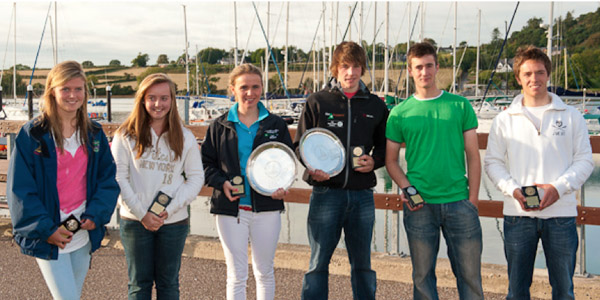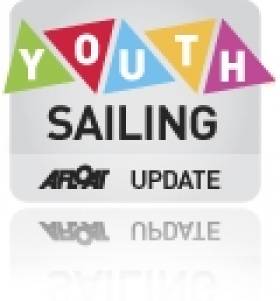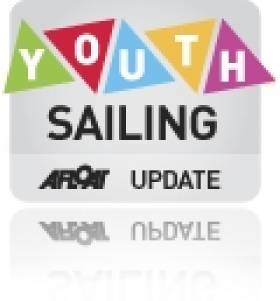Displaying items by tag: Curlane Bank
Cork Institute of Technology Win 2010 Student Yachting Nationals
Last weekend saw the Student Yachting Nationals take place at the Royal Cork Yacht Club. The students had the use of the ISA J80 Sailfleet for the event. Six college teams entered for the Nationals which was the Qualifier for the Student Yachting World Cup 2011.
Racing was scheduled for Cuskinny on Friday and conditions were ideal with 17-20 knots of breeze. Race Officer, Nathan Kirwan, got in four good races lasting some 40 to 50 minutes each. However, spinnakers were banned as some wipeouts had been observed by the ISA Bosun who exercised his judgment in this regard. Some two minutes after the start of the first race UCC skippered by Robert O'Leary suffered a snapped halyard but were refused redress. CIT skippered by George Kenefick lost their only winch handle overboard some three minutes before the start in race 1 but still managed to win the race by a comfortable margin. In race 2 UCC came back strongly to take the gun and pushing CIT into second place. At this stage match racing had begun between the two Cork colleges with each throwing dummy tacks to try to clear their air. In Race 3 TCD skippered by Alistair Kissane took the win with CIT in second and UCC third. The final race of the day was won by CIT with UCC third. Overall standings for Day One were: CIT 6pts, with UCC and TCD on 12 pts each. UCD had got off to a shaky start which was to prove costly for them as they were on form on days two and three.
On day two the Race Officer moved the course to the Curlane Bank and spinnakers were permitted. CIT found their rythym taking the bullet in race 5 with UCD in second and a poor mark rounding relegated UCC to third place. Race 6 saw the O'Leary and Kenefick teams doing circles at the pre start as the competition was intensifying and it was looking like a two horse race. UCC took first place with NUIG taking second and CIT third. Donagh Good of CIT went for a quick dip in the cold water but managed to grab on and was pulled back on board by George Kenefick and Kevin Goulding. Later during day 2 the wind was rising to 22 knots so spinnakers were once again banned. UCC found the conditions very much to their liking, taking the win, with TCD in second, UCC third and CIT fourth. Race 8 proved to be rather interesting with CIT managing to relegate UCC to last position and managing to keep UCC in their sight for the duration of the race. Downwind was difficult for CIT with UCC right on their tail but UCC were not successful in finding a passing lane. Again, UCD took their second bullet of the day with CIT and UCC in fifth and sixth positions some four to five minutes behind the rest of the fleet. CIT were able to discard their fifth position but UCC were unlucky in having to count their sixth as they also had a sixth from day one. TCD again got a second position. Results after day two were: CIT 14pts, UCC 19pts, UCD and TCD on 21pts each.
Day 3 was a non discardable coastal race from Crosshaven to Kinsale counting for 1.5pts. The start line was just off Roches Point with five knots of breeze and brilliant sunshine. UCC led the fleet and NUIG and CIT were in last position 300 metres behind the rest of the fleet. As the race went on the wind increased to a nice south westerly breeze of 12 to 14 knots. As this stage it looked as if it might be UCC's lucky day but Team CIT maintained their composure and by tacking close to the shore and keeping out of the tide managed to finish in third position at the Bulman Buoy with UCC first and UCD second. This result was to prove sufficient to give CIT the national student title for 2010.
Overall Results:
CIT 18.5pts
UCC 20.5pts
UCD 24pts
TCD 28.4pts
NUIG 33pts
UL 40pts
Doran Reigns In Junior All Ireland Event
It was a very long day of sailing in very light conditions for the Juniors on the second and final day of the All Ireland Junior Championship writes Claire Bateman. PRO Richard Leonard raced the fleet on the Curlane Bank in Cork harbour and was very fortunate to be able to get in three races in extremely difficult conditions.
The final result saw Philip Doran of Courtown Harbour SC taking first place with Rory Lynch of of Blessington Sailing Club second and Ross Vaughan of
Royal North of Ireland YC third.
In the Girls Fleet Sophie Murphy of Quoile YC took first place with Emma Geary of RCYC second and Katherine Geoghegan of Dungarvan Harbour SC third.
Photos of the Junior All Ireland Prizegiving and competition by Bob Bateman HERE.


























































